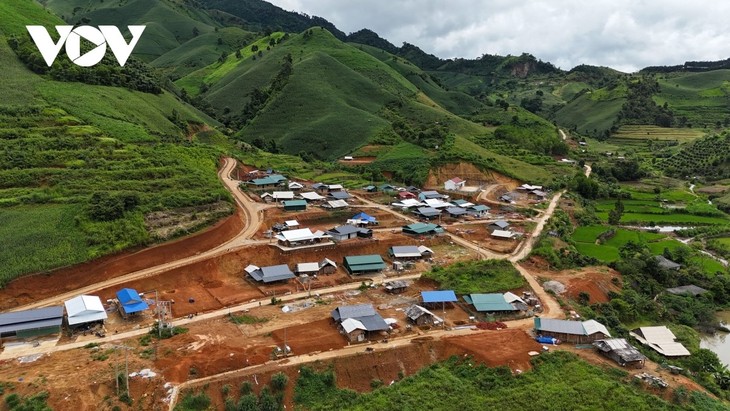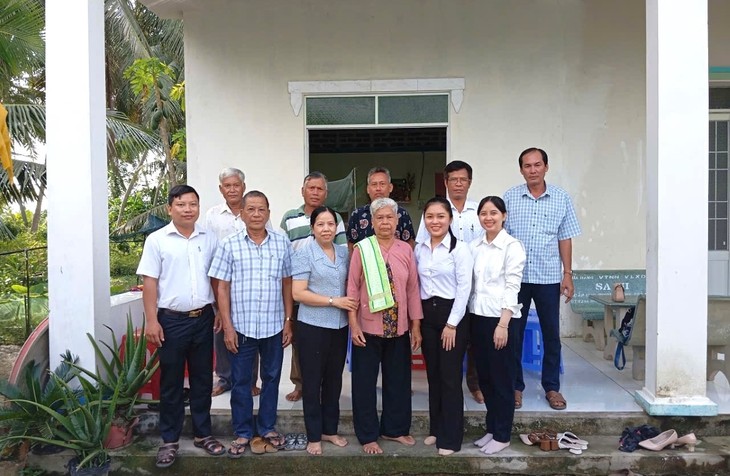(VOVWORLD) - Many disadvantaged families across Vietnam will celebrate their most memorable Lunar New Year 2025 yet, with new homes filled with the scent of fresh paint. These practical Tet gifts are parts of a nationwide campaign to eliminate temporary and dilapidated houses.
 Pu Hao border hamlet in Muong Lan Commune, Sop Cop District, Son La, emerges in the vibrant colors of its residents' new homes. (Photo: VOV) Pu Hao border hamlet in Muong Lan Commune, Sop Cop District, Son La, emerges in the vibrant colors of its residents' new homes. (Photo: VOV) |
Ahead of the Lunar New Year, Ms. Lau Thi Da’s home in Gia Khau 1 village, Lai Chau province, is filled with laughter and joy. Their relatives and neighbors all came to congratulate them on their new home and help them tidy up.
After living for years in a temporary house, this is the first year that Ms. Da’s family of the Mong ethnic group gets to spend the Lunar New Year in a sturdy and well-built home, thanks to a grant of 2,000 USD from the municipal Fatherland Front Committee and a loan of 1,200 USD from their relatives and neighbors.
And when donated furniture and household items arrived at their door the day they received their home, the family’s happiness doubled.
Da said, "My three children and I could never have had a home to live in without the government and local authorities’ support. It’s amazing that a low-income family like ours is cared for, and we will work hard to escape poverty."
In Son La province, the last houses in the border village of Pu Hao were handed over just in time for spring. For years, Pu Hao villagers had to live in clay-walled houses, constantly in fear of natural disasters. This year, they are finally settling into their new homes.
Ms. Thao Thi Chia from Pu Hao said, "With a new house, our Lunar New Year celebration this year will be much grander. We are preparing sticky rice cakes, a pig, and some chickens and will invite our parents and neighbors to celebrate our new home and the new year with us."
With the support of the armed forces and initiatives where households, villages, and the communities join hands to help one another, thousands of poor families in the northern mountainous region of Son La, Lao Cai, Lai Chau, Dien Bien, and Yen Bai, have moved on from dilapidated housing to new and sturdy homes, just like Ms. Da and Ms. Chia did.
"Today, I’m so happy that my three children and I are moving into this beautiful, spacious new home. I used to only dream of such a house, but now it’s no longer a dream," one beneficiary from the program shared.
"The State and relevant agencies gave me this warm and sturdy house. I’m so happy and moved. My wife and I will work hard to escape poverty." another said.
 A family in Phuoc Hung Commune, Tra Cu District, Tra Vinh Province who just received their new home. (Photo: Khac Luong/tracu.travinh.gov.vn) A family in Phuoc Hung Commune, Tra Cu District, Tra Vinh Province who just received their new home. (Photo: Khac Luong/tracu.travinh.gov.vn) |
People in the Mekong Delta also shared the joy of moving into new homes. Mrs. Thach Thi Xiem’s family in Ngoc Bien commune, Tra Vinh province, had long struggled with their dilapidated house. But with their unstable income, they could not pay for repairs
With the support of the Ministry of Public Security, Mrs. Xiem’s family now has a new home. She said: "Our home was leaky, but I didn’t know how to fix it. Now that we have a new home, I’ll work hard to improve my life and escape poverty. Thanks to the State’s support, I now have a proper home."
For families in difficult circumstances, a furnished, sturdy home is a foundation and encouragement for them to improve their lives.
Mr. Kim Quynh Anh, a Khmer from Tan My commune, Tra On district, Vinh Long province, said, "My family and our neighbors have all received new houses built by the State that are sturdy and spacious. Many of us have escaped poverty. Receiving this house has motivated me to overcome difficulties and strive for a better life."
Eliminating temporary and dilapidated housing has become a widespread movement and a highlight of sustainable poverty reduction work in many localities. These new homes have been built from the collective efforts of the government, local authorities, and the entire community.
A local government's representative shared, "Mobilizing a diverse range of resources has proved effective for us. In addition to contributions from the State and the community, we have encouraged families, volunteers, public security, military, and other organizations to help with construction. We have also asked people with influence to advocate and encourage the participation of their ethnic communities."
"Transporting construction materials to remote locations is very costly, so we have asked local associations for help during the weekend. Even in this cold weather, helping others makes all of us feel warm," another said.
From now until the end of the year, new homes will continue to be built across the country, replacing temporary and unsafe shelters and helping people stabilize their lives. They not only provide a safe haven but also motivate struggling families to work towards a brighter future as the Lunar New Year approaches.